please read every pages carefully and answer correctly
i got previous answer incorrect from other expert
we are group of 20 people if you answered correctly you will get 20 upvotes
and if you answered incorrectly you will get 20 downvotes
WHEN CONDITION TO BE TREATED AS WARRANTY (SECTION 13) may condition or elect to treat the breach of the condition as a breach of warranty and not as a ground y
treating the contract as repudiated [Sub-section (1)]
Where a contract of sale is not severable and the buyer has accepted the goods or part thereof, the breaches any condition to be fulfilled by the seller can only be treated as a breach of warranty and not as a ground rejecting the goods and treating the contract as repudiated, unless there is a term of the contract, exp or implied to that effect. [Sub-section (2)]
Nothing in this section shall affect the case of any condition or warranty fulfilment of which is excused law by reason of impossibility or otherwise. [Sub-section (3)]
Analysis:
Section 13 specifies cases where a breach of condition be treated as a breach of warranty. As a result which the buyer loses his right to rescind the contract and can claim for damages only. In the following cases, a contract is not avoided even on account of a breach of a condition:
Where the buyer altogether waives the performance of the condition. A party may for his own bene waive a stipulation.
(i) Where the buyer elects to treat the breach of the conditions, as one of a warranty. That is to say, he ma
claim only damages instead of repudiating the contract.
Example: A agrees to supply B 10 bags of first quality sugar @ 625 per bag but supplies only sect quality sugar, the price of which is 600 per bag. There is a breach of condition and the buyer can rejec the goods. But if the buyer so elects, he may treat it as a breach of warranty, accept the second qui sugar and claim damages @ 25 per bag.
(Where the contract is non-severable and the buyer has accepted either the whole goods or any g thereof. Acceptance means acceptance as envisaged in Section 72 of the Indian Contract Act, 1872
(iv) Where the fulfillment of any condition or warranty is excused by law by reason of impossibility otherwise.
Waiver of conditions
Voluntary Waiver
Waives performance of contract Elect to treat condition as warranty
Compulsory Waiver
Non-severability of contract Fulfilment of conditions excused by law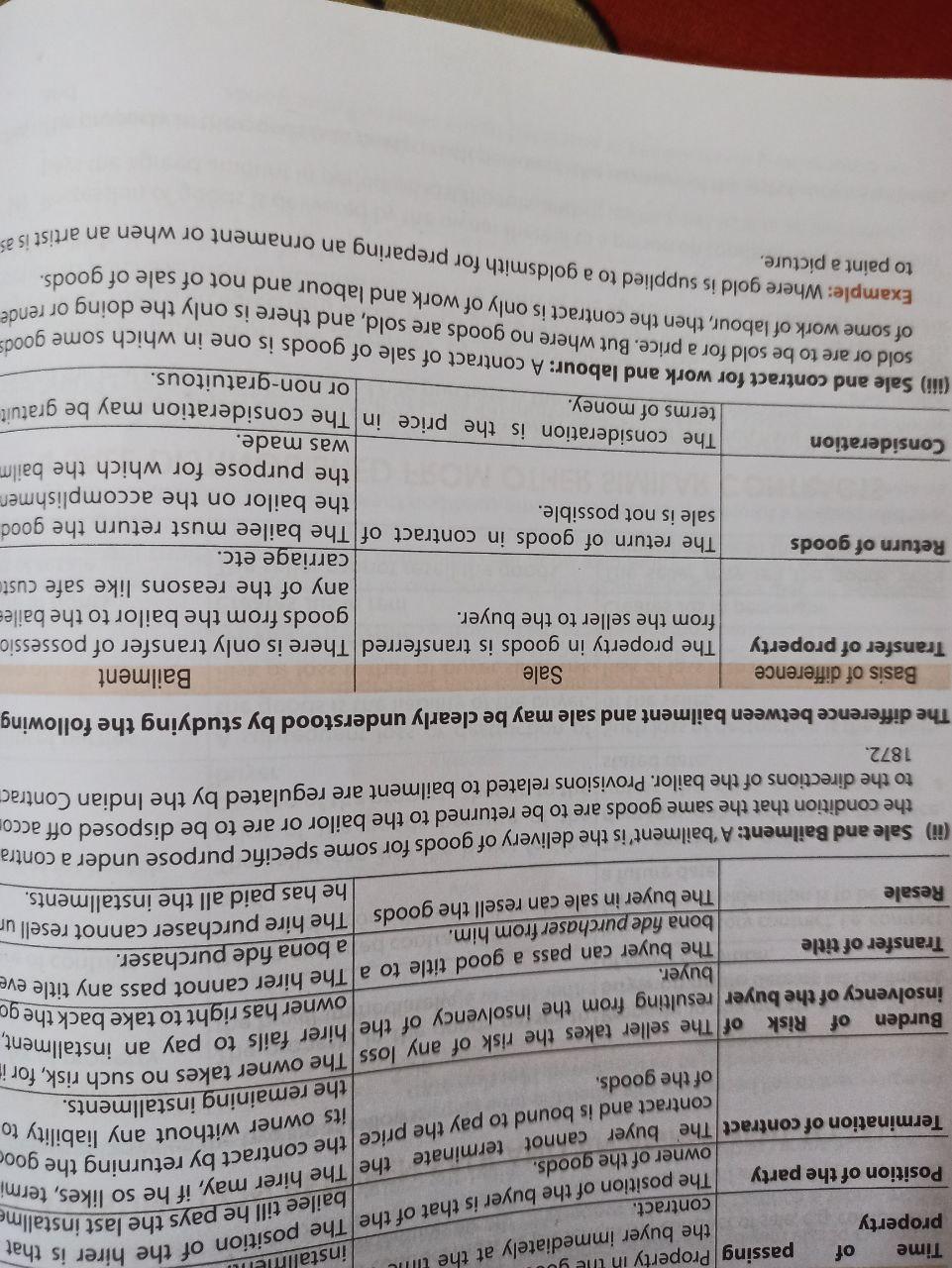
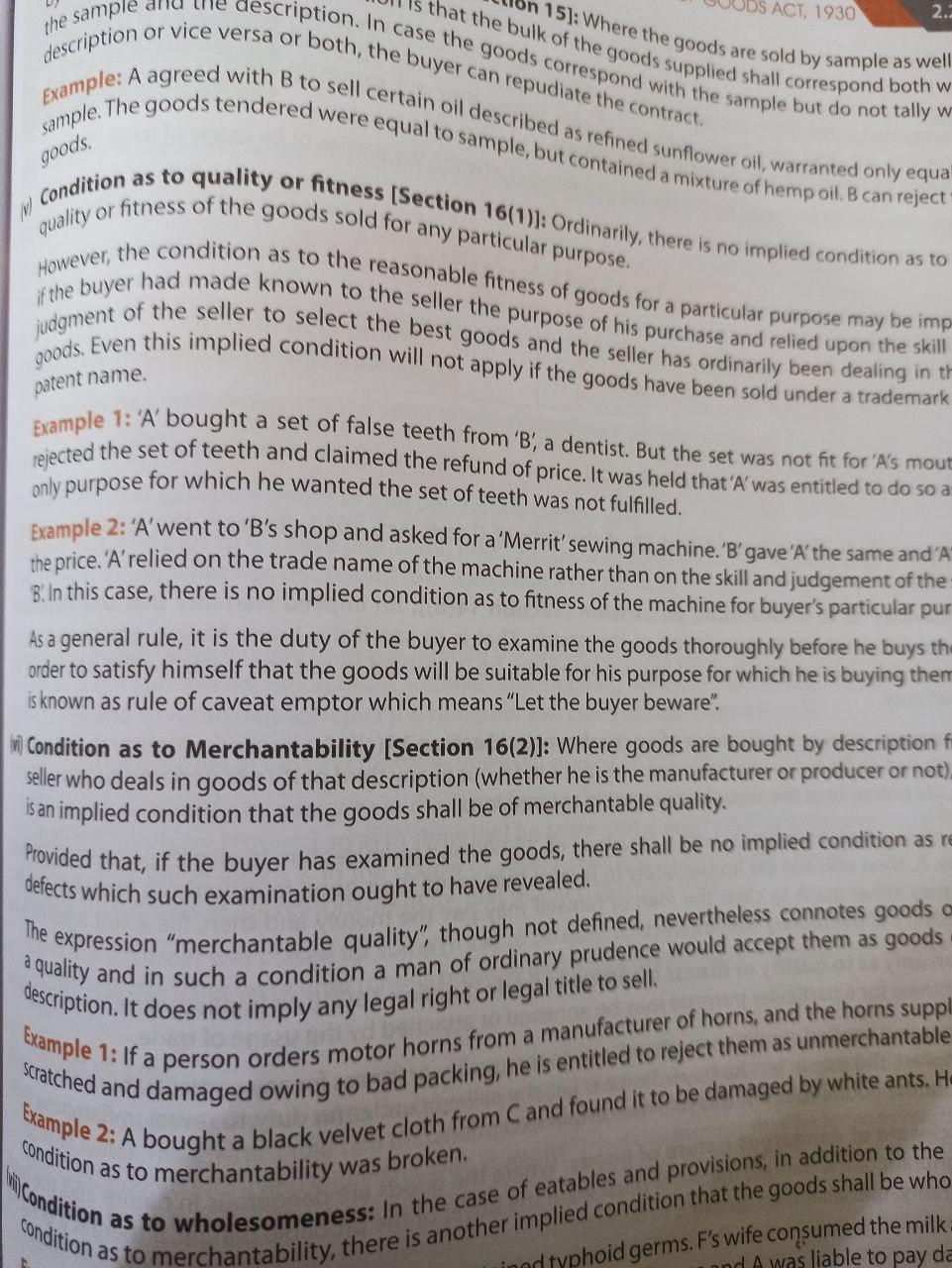
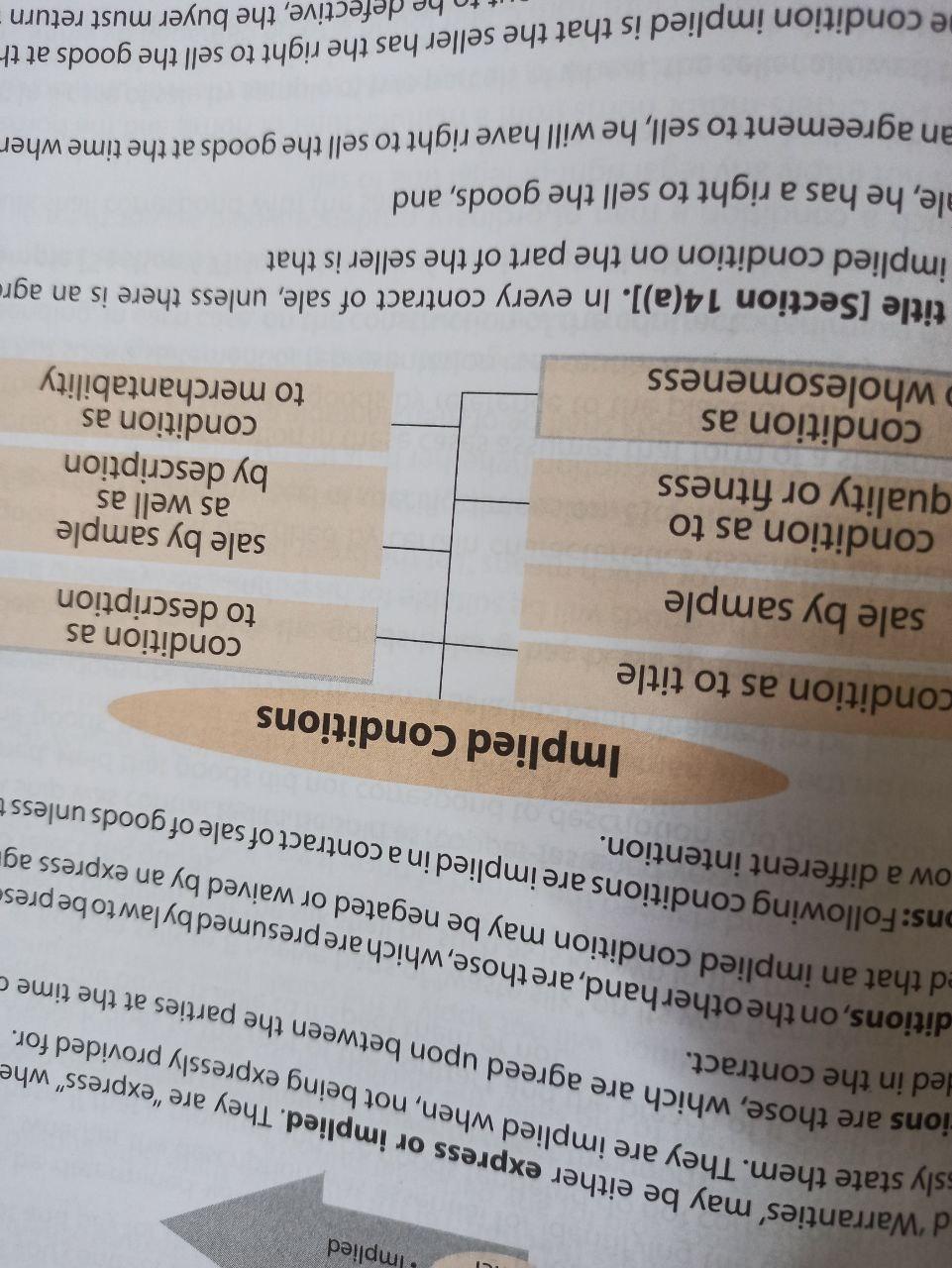
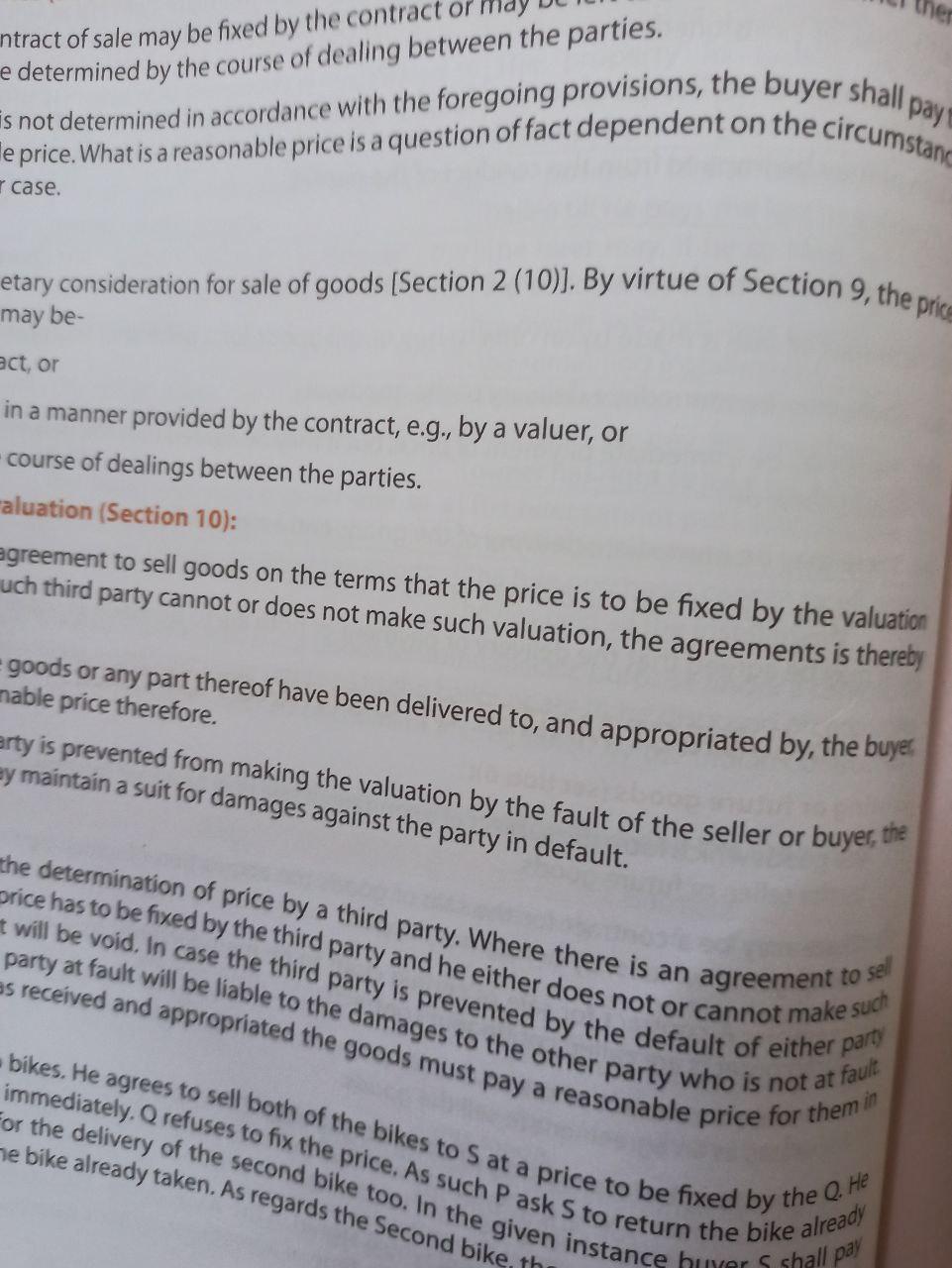
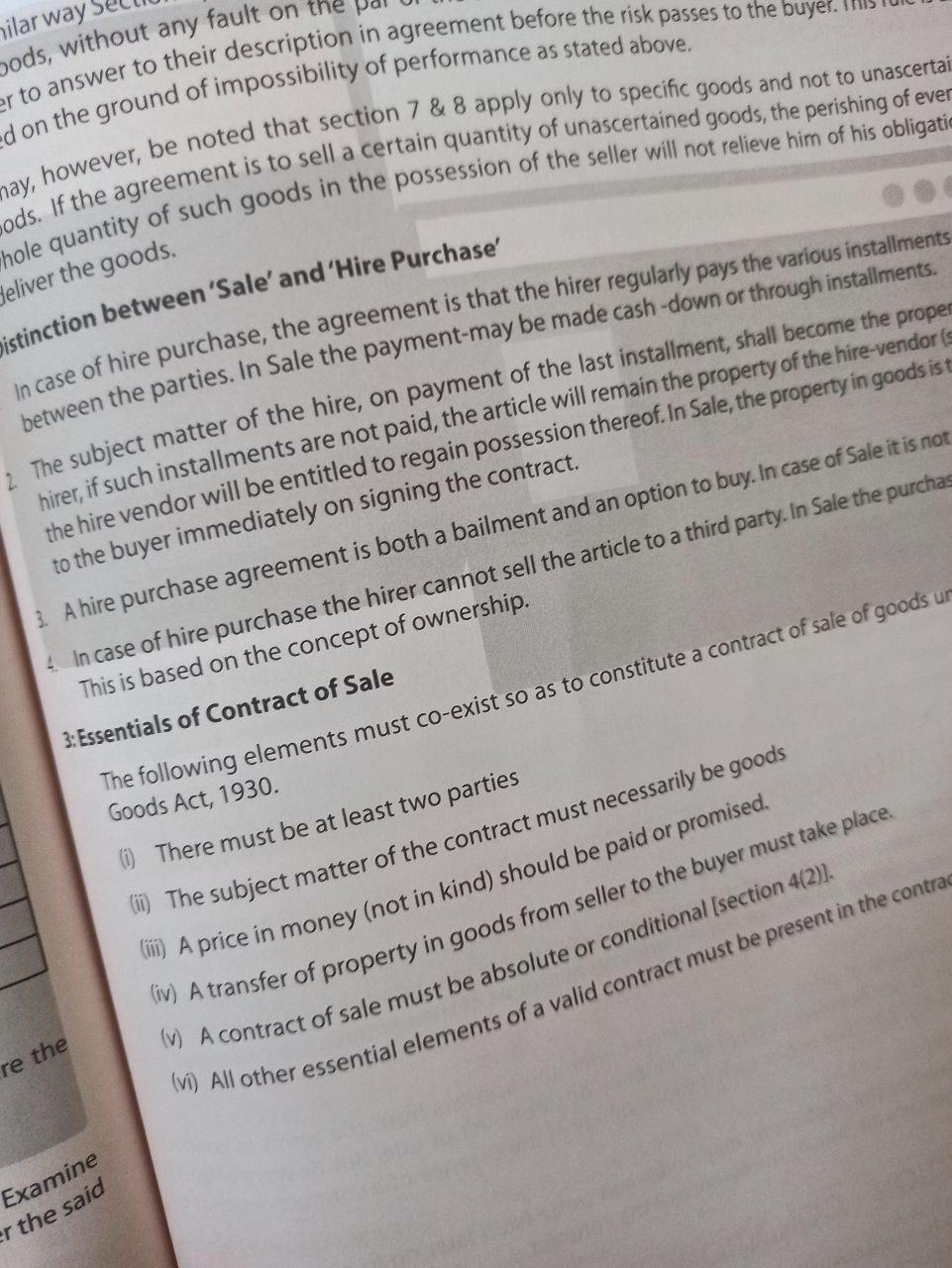

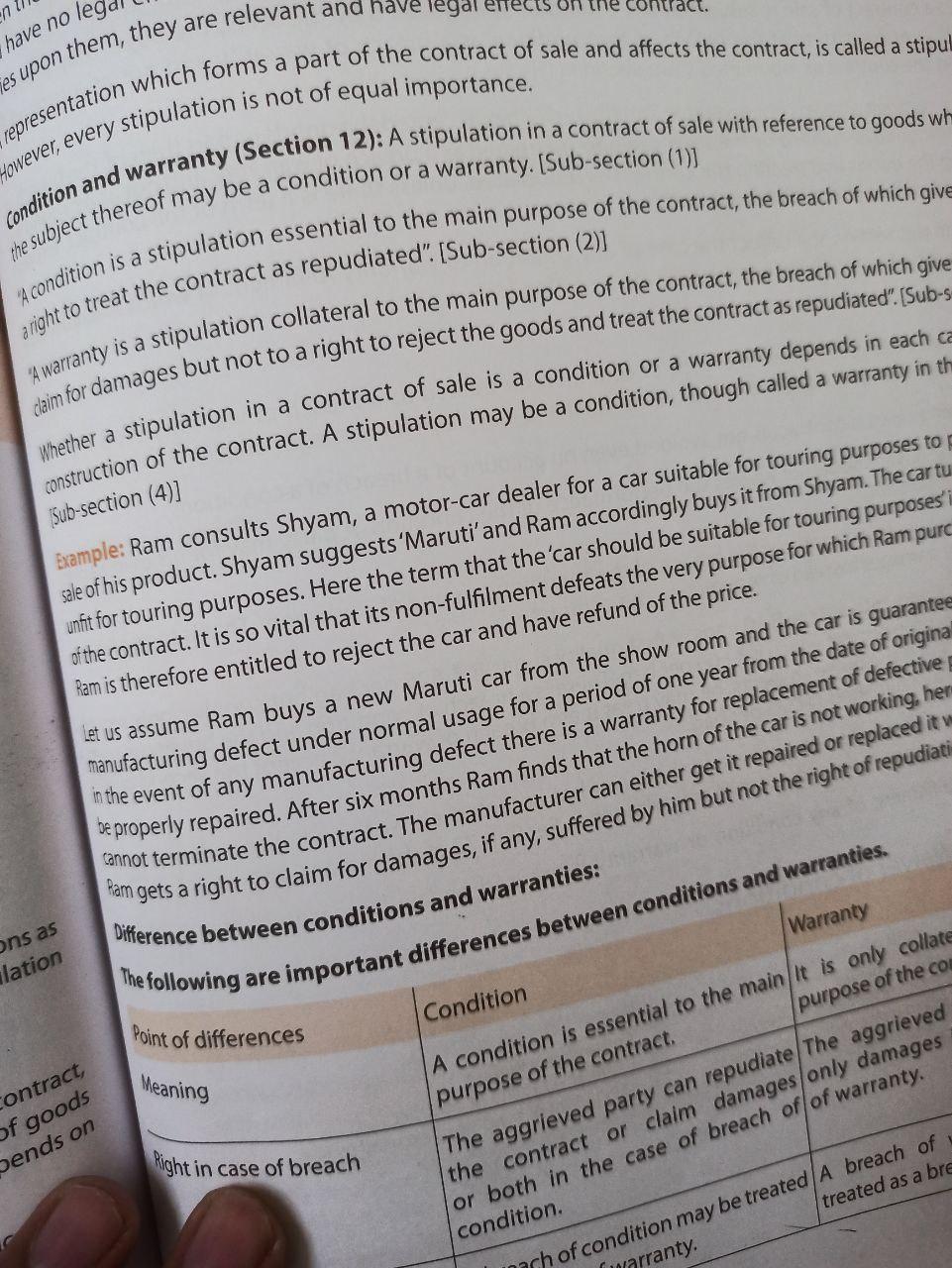

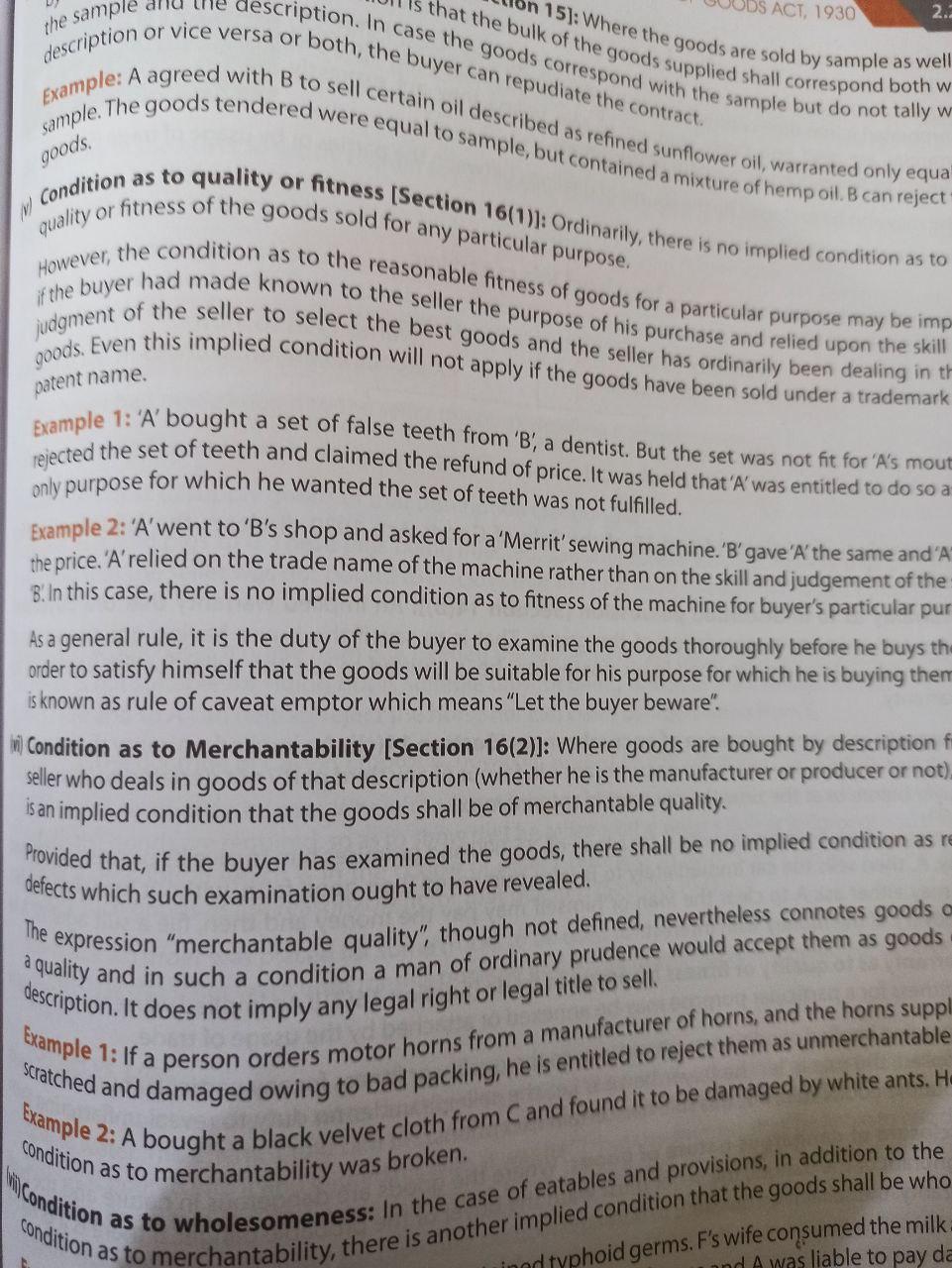
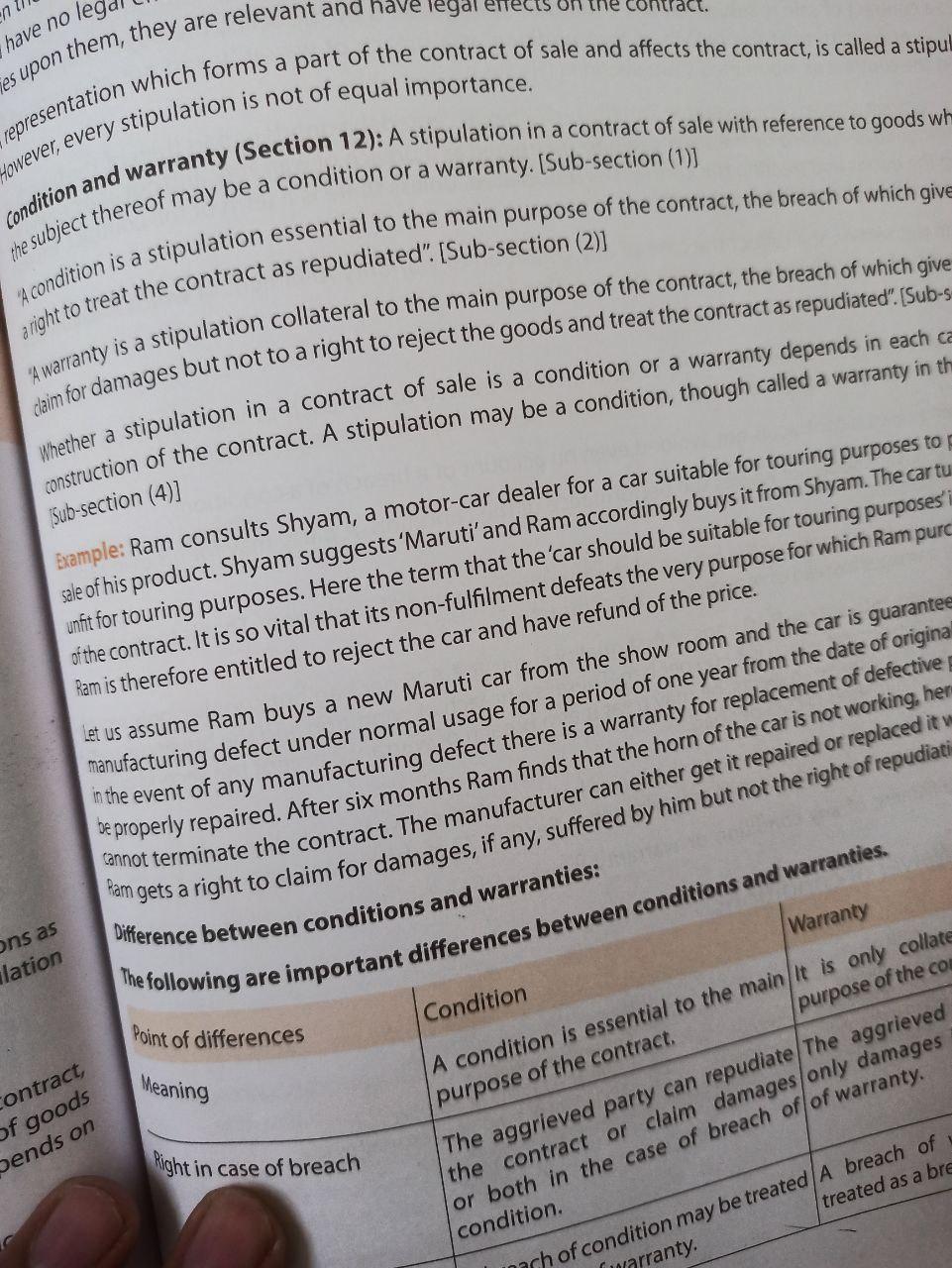

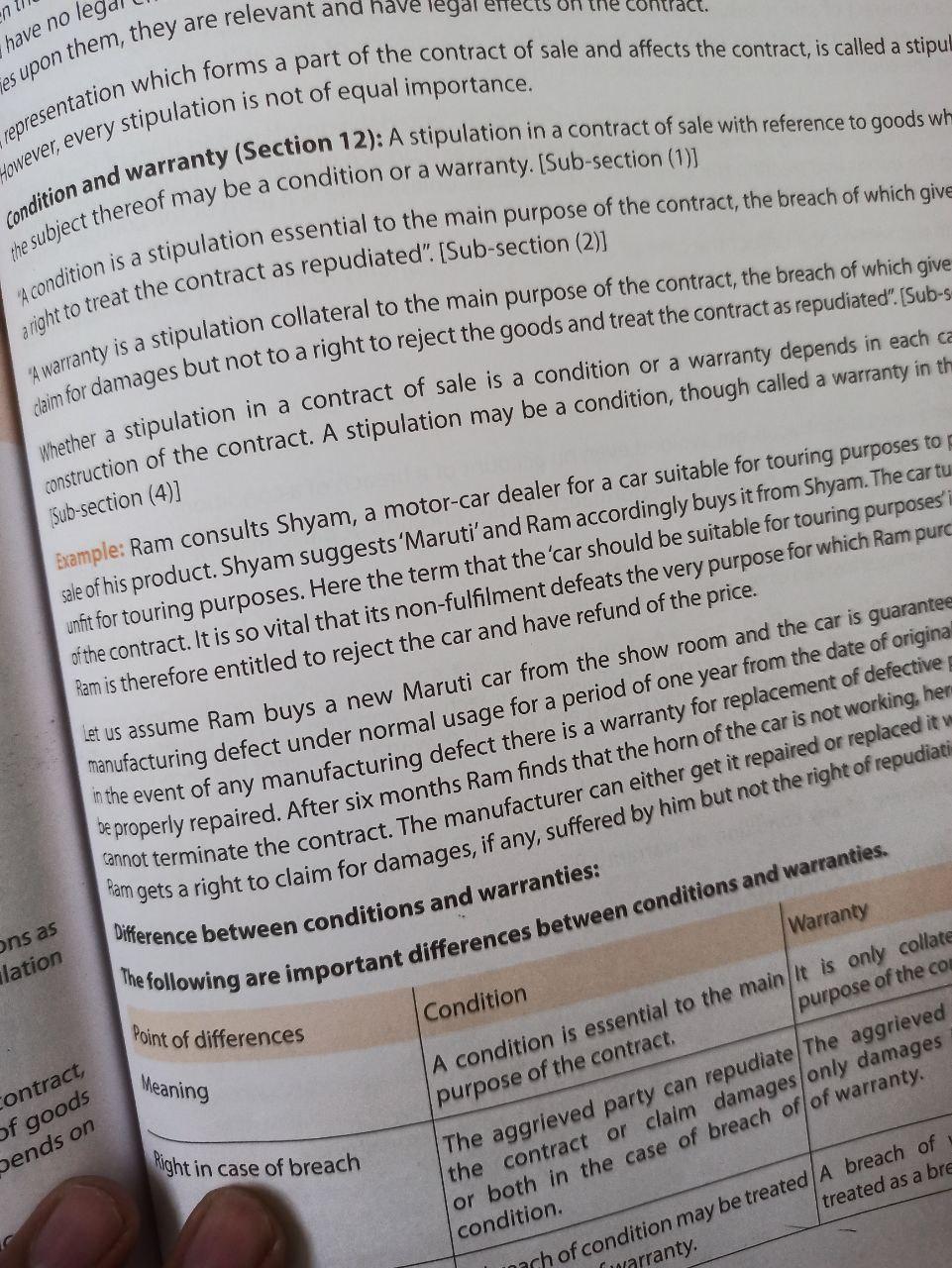
(ii) Sale and Bailment: A bailment' is the delivery of goods tor sumite spown- r be disposed off acco the condition that the same goods are to be returned to the bailor or are to be disposed off acco 1872. The difference between bailment and sale may be clearly understood by studying the following suiu vi are to de sold for a price. But where no goods a sale of goods is one in which some good: of some work of labour, then the contract is only of wore sold, and there is only the doing or to paint a picture. the samption or vice versa or both, the buyer goods correspoods supplied shall correspond both w zxample: A agreed with B to sell cer correspond with the sample but do not tally w -xample. The goods tendered were certain oil described as refined suin. goods. quality or fitness of the goods sold for any particular prdinarily, there is no implied condition as to However, the condition as to the reasonable fitness of goostefore. if the buyer had made known to the seller fitness of goods for a particular purpose may be imp iudgment of the seller to select the best the purpose of his purchase and relied upon the skill goods. Even this implied condition will not apply if the seller has ordinarily been dealing in th patent name. Example 1: 'A' bought a set of false teeth from ' B ', a dentist. But the set was not fit for 'A's mout rejected the set of teeth and claimed the refund of price. It was held that ' A ' was entitled to do so a only purpose for which he wanted the set of teeth was not fulfilled. Example 2: 'A'went to 'B's shop and asked for a 'Merrit'sewing machine. 'B' gave 'A' the same and 'A the price. 'A' relied on the trade name of the machine rather than on the skill and judgement of the 8. In this case, there is no implied condition as to fitness of the machine for buyer's particular pur As a general rule, it is the duty of the buyer to examine the goods thoroughly before he buys th order to satisfy himself that the goods will be suitable for his purpose for which he is buying them is known as rule of caveat emptor which means "Let the buyer beware". in) Condition as to Merchantability [Section 16(2)]: Where goods are bought by description seller who deals in goods of that description (whether he is the manufacturer or producer or not) is an implied condition that the goods shall be of merchantable quality. Provided that, if the buyer has examined the goods, there shall be no implied condition as defects which such examination ought to have revealed. The expression "merchantable quality", though not defined, nevertheless connotes goods aquality and in such a condition a man of ordinary prudence would accept them as goods description. It does not imply any legal right or legal title to sell. Example 1: If a person orders motor horns from a manufacturer of horns, and the horns suppl scratched and damaged owing to bad packing, he is entitled to reject them as unmerchantable Example 2: A bought a black velvet cloth from C and found it to be damaged by white ants. H condition as to merchantability was broken. condition as to wholesomeness: In the case of eatables and provisions, condition that the goods shall be who d 'Warranties' may be either express or implied. They are "express" whe isly state them. They are implied when, not being expressly provided for. ions are those, which are agreed upon between the parties at the time led in the contract. ditions, on the otherhand, are those, which are presumed by law to be pres it that an implied condition may be negated or waived by an express ag ins: Following conditions are implied in a contract of sale of goods unless ow a different intention. Impliadran-r.. title [Section 14(a)]. In every contract of sale, unless there is an agr implied condition on the part of the seller is that le, he has a right to sell the goods, and an agreement to sell, he will have right to sell the goods at the time wher e condition implied is that the seller has the right to sell the goods at th ntract of sale may be fixed by the contract or may warties. is not determined in accordance with the foregoing provisions, the buyer shall pay e price. What is a reasonable price is a question of fact dependent on the circumstane case. etary consideration for sale of goods [Section 2 (10)]. By virtue of Section 9, the prica may be- in a manner provided by the contract, e.g., by a valuer, or course of dealings between the parties. aluation (Section 10): agreement to sell goods on the terms that the price is to be fixed by the valuation uch third party cannot or does not make such valuation, the agreements is thereby goods or any part thereof have been delivered to, and appropriated by, the buyet nable price therefore. arty is prevented from making the valuation by the fault of the seller or buyer, the y maintain a suit for damages against the party in default. the determination of price by a third party. Where there is an agreement to sell orice has to be fixed by the third party and he either does not or cannot make such thill be void. In case the third party is prevented by the default of either part) party at fault will be liable to the damages to the other party who is not at fault is received and appropriated the goods must pay a reasonable price for them in bikes. He agrees to sell both of the bikes to S at a price to be fixed by the Q. He immediately. Q refuses to fix the price, As such P ask S to return the bike already or the delivery of the second bike too, In the given instance hime bike alreadly ds, without any fault on the to answer to their description in agreement before the risk passes (i) There must be at least two parties (ii) The subject matter of the contract must necessarily be goods (vi) All other essential elementition or conditiona which forms a part of the contract of sale and affects the contract, is called a stipu mor damages but not to a right to Ram consults Shyam, a motor-car dealer for a car suitable for touring purposes to - Shyam suggests 'Maruti' and Ram accordingly buys it from Shyam. The car tu Ram is therefore entitled to reject the car and have refund of the price. inthe event of any manufacturing defect the date of origina se properly repaired. After six months Ram gets a right to claim for damages, if any, suffered by him but not the re ight of the repudiatine purpose of the contract. condition. \begin{tabular}{l} Warranty \\ It is only collat purpose of the co \\ The aggrieved only damages of warranty. \\ \hline \end{tabular} 2 Breach of condition gives the aggrieved party- (a) Right to sue for damages (b) Right to repudiate the contract (c) Both (a) and (b) (d) None of these is - the samption or vice versa or both, the buyer goods correspoods supplied shall correspond both w zxample: A agreed with B to sell cer correspond with the sample but do not tally w -xample. The goods tendered were certain oil described as refined suin. goods. quality or fitness of the goods sold for any particular prdinarily, there is no implied condition as to However, the condition as to the reasonable fitness of goostefore. if the buyer had made known to the seller fitness of goods for a particular purpose may be imp iudgment of the seller to select the best the purpose of his purchase and relied upon the skill goods. Even this implied condition will not apply if the seller has ordinarily been dealing in th patent name. Example 1: 'A' bought a set of false teeth from ' B ', a dentist. But the set was not fit for 'A's mout rejected the set of teeth and claimed the refund of price. It was held that ' A ' was entitled to do so a only purpose for which he wanted the set of teeth was not fulfilled. Example 2: 'A'went to 'B's shop and asked for a 'Merrit'sewing machine. 'B' gave 'A' the same and 'A the price. 'A' relied on the trade name of the machine rather than on the skill and judgement of the 8. In this case, there is no implied condition as to fitness of the machine for buyer's particular pur As a general rule, it is the duty of the buyer to examine the goods thoroughly before he buys th order to satisfy himself that the goods will be suitable for his purpose for which he is buying them is known as rule of caveat emptor which means "Let the buyer beware". in) Condition as to Merchantability [Section 16(2)]: Where goods are bought by description seller who deals in goods of that description (whether he is the manufacturer or producer or not) is an implied condition that the goods shall be of merchantable quality. Provided that, if the buyer has examined the goods, there shall be no implied condition as defects which such examination ought to have revealed. The expression "merchantable quality", though not defined, nevertheless connotes goods aquality and in such a condition a man of ordinary prudence would accept them as goods description. It does not imply any legal right or legal title to sell. Example 1: If a person orders motor horns from a manufacturer of horns, and the horns suppl scratched and damaged owing to bad packing, he is entitled to reject them as unmerchantable Example 2: A bought a black velvet cloth from C and found it to be damaged by white ants. H condition as to merchantability was broken. condition as to wholesomeness: In the case of eatables and provisions, condition that the goods shall be who which forms a part of the contract of sale and affects the contract, is called a stipu mor damages but not to a right to Ram consults Shyam, a motor-car dealer for a car suitable for touring purposes to - Shyam suggests 'Maruti' and Ram accordingly buys it from Shyam. The car tu Ram is therefore entitled to reject the car and have refund of the price. inthe event of any manufacturing defect the date of origina se properly repaired. After six months Ram gets a right to claim for damages, if any, suffered by him but not the re ight of the repudiatine purpose of the contract. condition. \begin{tabular}{l} Warranty \\ It is only collat purpose of the co \\ The aggrieved only damages of warranty. \\ \hline \end{tabular} which forms a part of the contract of sale and affects the contract, is called a stipu mor damages but not to a right to Ram consults Shyam, a motor-car dealer for a car suitable for touring purposes to - Shyam suggests 'Maruti' and Ram accordingly buys it from Shyam. The car tu Ram is therefore entitled to reject the car and have refund of the price. inthe event of any manufacturing defect the date of origina se properly repaired. After six months Ram gets a right to claim for damages, if any, suffered by him but not the re ight of the repudiatine purpose of the contract. condition. \begin{tabular}{l} Warranty \\ It is only collat purpose of the co \\ The aggrieved only damages of warranty. \\ \hline \end{tabular}


















